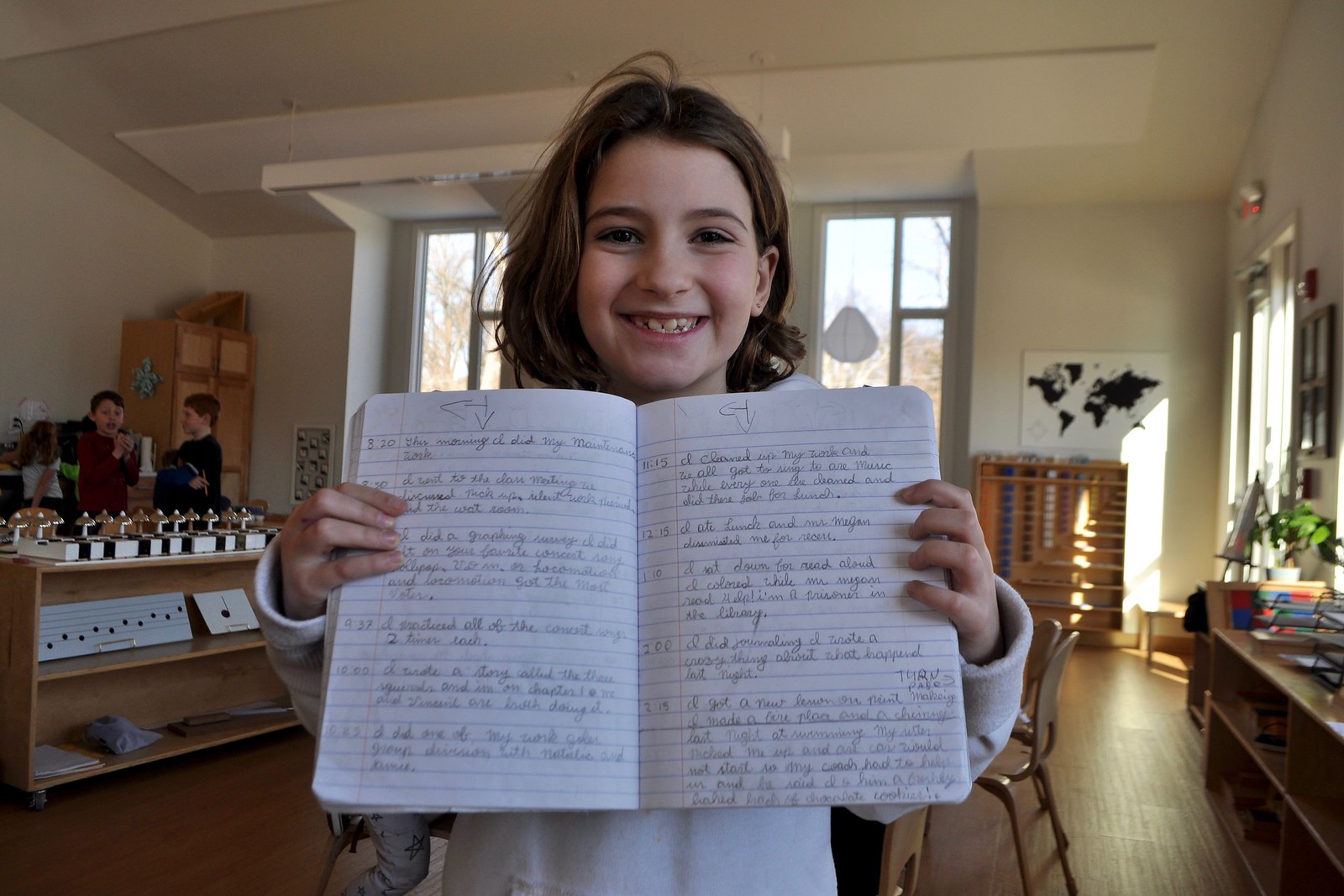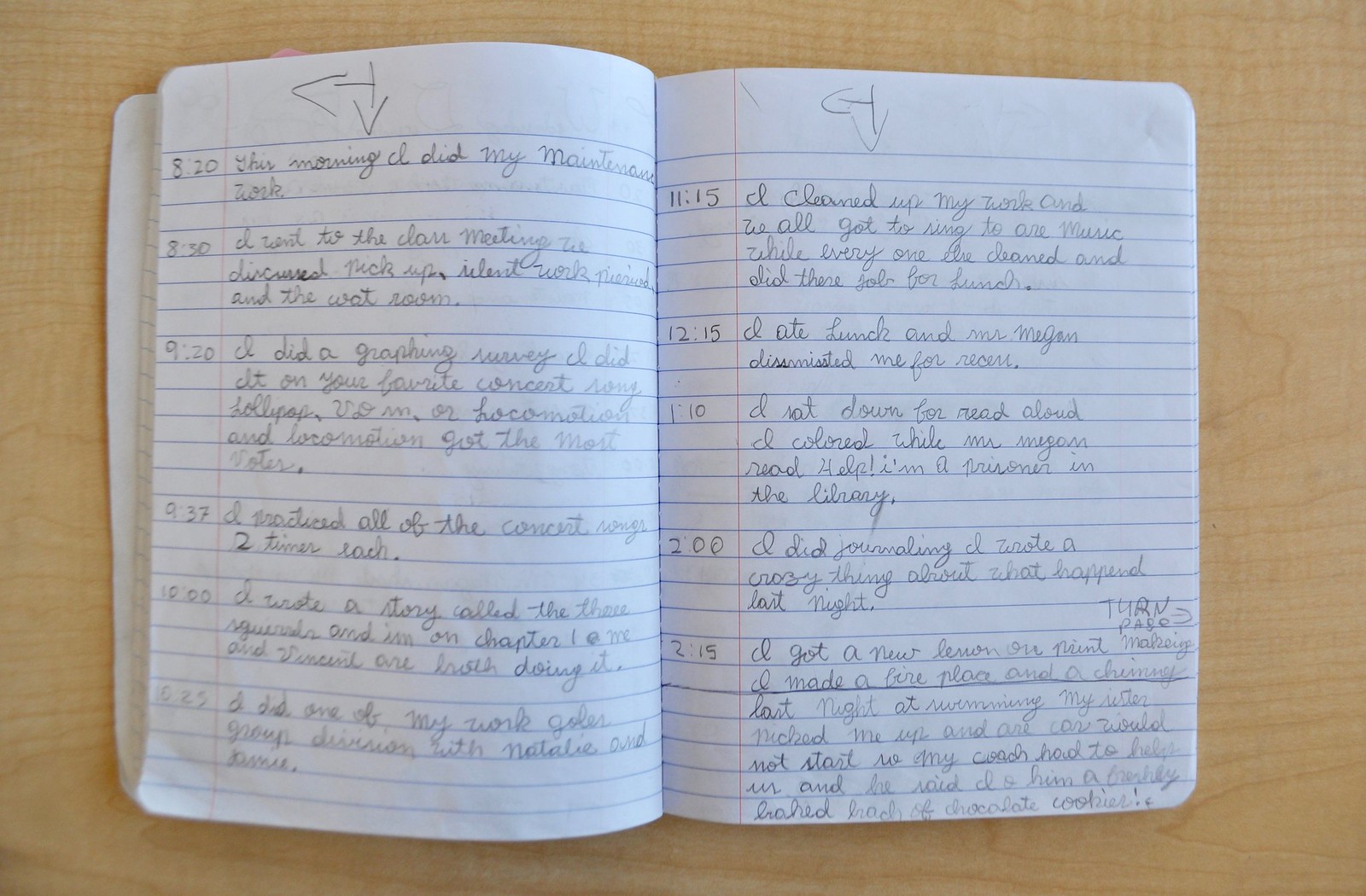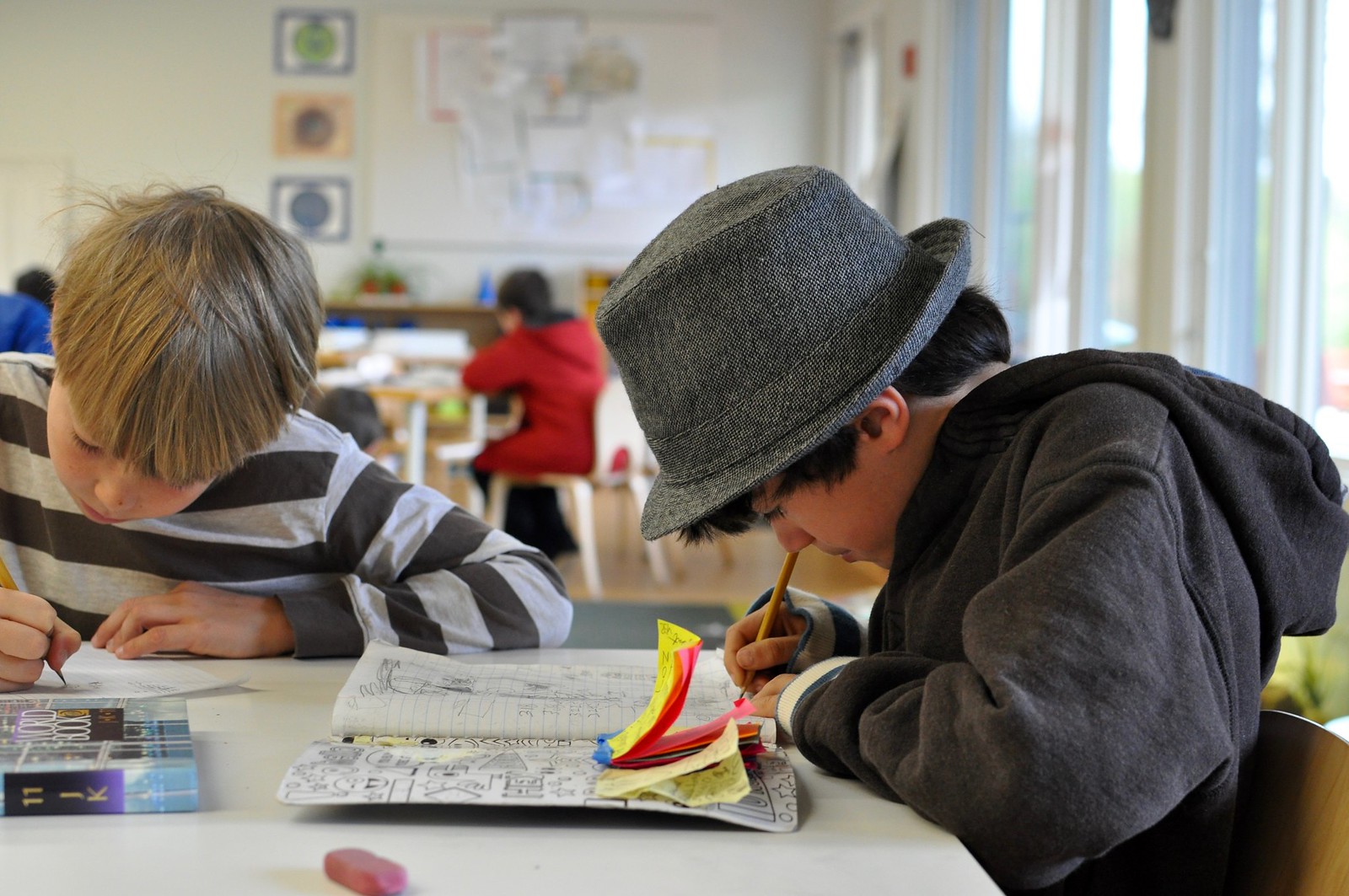The Work Journal
 “We must clearly understand that when we give the child freedom and independence, we are giving freedom to a worker already braced for action, who cannot live without working and being active.” (Maria Montessori: The Absorbent Mind)The Elementary work journal is an integral part of the self-regulation and "freedom and responsibility" aspects of learning valued in Montessori education. There is an amazing depth of work encompassed in the work journal, and, like other Montessori works, it evolves and serves the Elementary child in such a large capacity. More than just a work log, the journal serves to promote and support learning, not simply record it. Learn more below.
“We must clearly understand that when we give the child freedom and independence, we are giving freedom to a worker already braced for action, who cannot live without working and being active.” (Maria Montessori: The Absorbent Mind)The Elementary work journal is an integral part of the self-regulation and "freedom and responsibility" aspects of learning valued in Montessori education. There is an amazing depth of work encompassed in the work journal, and, like other Montessori works, it evolves and serves the Elementary child in such a large capacity. More than just a work log, the journal serves to promote and support learning, not simply record it. Learn more below. The Elementary work journal is a written account of how a child spends his day. It is not a place to take notes or plan future work; rather, it is more of a log recording what work and lessons the child has engaged in throughout each day. The child records the time he begins each separate work or lesson on the page where he has written the date at the top. And yes, there is even a lesson on the work journal!
The Elementary work journal is a written account of how a child spends his day. It is not a place to take notes or plan future work; rather, it is more of a log recording what work and lessons the child has engaged in throughout each day. The child records the time he begins each separate work or lesson on the page where he has written the date at the top. And yes, there is even a lesson on the work journal!

 The work journal is an introduction to time management, but more importantly, it serves as a tool of self-assessment. A child can look back on her day and assess how much time was spent on a certain work, or even what is lacking and needs extra attention. It is this initiative-taking that is so integral to the Montessori learning experience; an empowered child who is ultimately in charge of her work will be more deeply engaged with her work and the whole process.
The work journal is an introduction to time management, but more importantly, it serves as a tool of self-assessment. A child can look back on her day and assess how much time was spent on a certain work, or even what is lacking and needs extra attention. It is this initiative-taking that is so integral to the Montessori learning experience; an empowered child who is ultimately in charge of her work will be more deeply engaged with her work and the whole process. Lower Elementary Guide Megan Eilers shares:"Along with a weekly conference, the work journal is a way for the guide to assess how the child is using her time. The work journal holds the child accountable for her time spent in the classroom. On a daily basis, the guide checks to see if the child is following up with presentations and is meeting the classroom and societal expectations. These daily check-ups promote lots of great discussions and help guide the child in planning her time in the future.
Lower Elementary Guide Megan Eilers shares:"Along with a weekly conference, the work journal is a way for the guide to assess how the child is using her time. The work journal holds the child accountable for her time spent in the classroom. On a daily basis, the guide checks to see if the child is following up with presentations and is meeting the classroom and societal expectations. These daily check-ups promote lots of great discussions and help guide the child in planning her time in the future.
 "The work journal often becomes a source of pride for the child. During the first couple of weeks, the children enjoy spending time decorating and personalizing the covers of their journal. Within the pages, I often find the margins adorned with colorful and intricate design work. Many children often use the work journal to experiment with the font and sizing of their letters. I have seen everything from itty-bitty microscopic words to large block letters.
"The work journal often becomes a source of pride for the child. During the first couple of weeks, the children enjoy spending time decorating and personalizing the covers of their journal. Within the pages, I often find the margins adorned with colorful and intricate design work. Many children often use the work journal to experiment with the font and sizing of their letters. I have seen everything from itty-bitty microscopic words to large block letters. "The younger child who is still learning how to tell time and how to spell and form letters, might only write a partial word that reflects a work and may use inventive spelling, but the key here is that the child is going through the process of reflecting on her work. As the child becomes more skilled at recording her work, she might begin writing in complete sentences and include more detailed information about the work. Other lessons I give with the work journal are: journaling- writing a reflection and graphing- an analysis of one’s time in the classroom.
"The younger child who is still learning how to tell time and how to spell and form letters, might only write a partial word that reflects a work and may use inventive spelling, but the key here is that the child is going through the process of reflecting on her work. As the child becomes more skilled at recording her work, she might begin writing in complete sentences and include more detailed information about the work. Other lessons I give with the work journal are: journaling- writing a reflection and graphing- an analysis of one’s time in the classroom.
Practically everywhere the Montessori child goes, his work journal goes too. The work journal is the first thing an Elementary child picks up in the morning, the last thing he puts away. It is carried from table to floor, its pages growing more wrinkled as the school year wears on. It is the tattered, well-loved companion that waits patiently in the wings while lessons are completed; it is the sticky-note and doodle-clad workbook that bears the battle scars of much erasure and correction. The work journal is also a wonderful example of the idea of freedom with responsibility that is so integral to Montessori education. Inner discipline takes awhile to achieve, but is essential to one's self-construction, and is a long-lasting effect of being given freedom with expectations. The expectations set around the daily work journal (for instance, recording the day, date and time of lessons and work; keeping the journal close by; using one's best handwriting, etc.) serve as daily records and reminders to a child of appropriate classroom behavior and progress.
The work journal is also a wonderful example of the idea of freedom with responsibility that is so integral to Montessori education. Inner discipline takes awhile to achieve, but is essential to one's self-construction, and is a long-lasting effect of being given freedom with expectations. The expectations set around the daily work journal (for instance, recording the day, date and time of lessons and work; keeping the journal close by; using one's best handwriting, etc.) serve as daily records and reminders to a child of appropriate classroom behavior and progress. Oftentimes, the work journal is a sort of rite of passage. For the First Year child, fresh from the Children's House, the work journal serves as an introduction to the next phase of education, an acknowledgement that more is expected of them. Though the handwriting may at first be illegible, it is the act of documenting and recording the work of the day that has the biggest impact.
Oftentimes, the work journal is a sort of rite of passage. For the First Year child, fresh from the Children's House, the work journal serves as an introduction to the next phase of education, an acknowledgement that more is expected of them. Though the handwriting may at first be illegible, it is the act of documenting and recording the work of the day that has the biggest impact.


 The work journal is valuable in another way; it provides a child with an opportunity for self-assessment. Self-assessment is a crucial piece of metacognition; it is an ability to observe, take a step back from one’s own work, recognize errors or areas for improvement, self-regulate and ultimately self-correct. The act of self-assessment is made easier through weekly conferences with a child's Guide - a topic we will discuss in greater depth in another blog post.
The work journal is valuable in another way; it provides a child with an opportunity for self-assessment. Self-assessment is a crucial piece of metacognition; it is an ability to observe, take a step back from one’s own work, recognize errors or areas for improvement, self-regulate and ultimately self-correct. The act of self-assessment is made easier through weekly conferences with a child's Guide - a topic we will discuss in greater depth in another blog post.



 “Independence is not a static condition; it is a continuous conquest, and in order to reach not only freedom, but also strength, and the perfecting on one’s powers, it is necessary to follow this path of unremitting toil.” (Maria Montessori: The Absorbent Mind)
“Independence is not a static condition; it is a continuous conquest, and in order to reach not only freedom, but also strength, and the perfecting on one’s powers, it is necessary to follow this path of unremitting toil.” (Maria Montessori: The Absorbent Mind)



